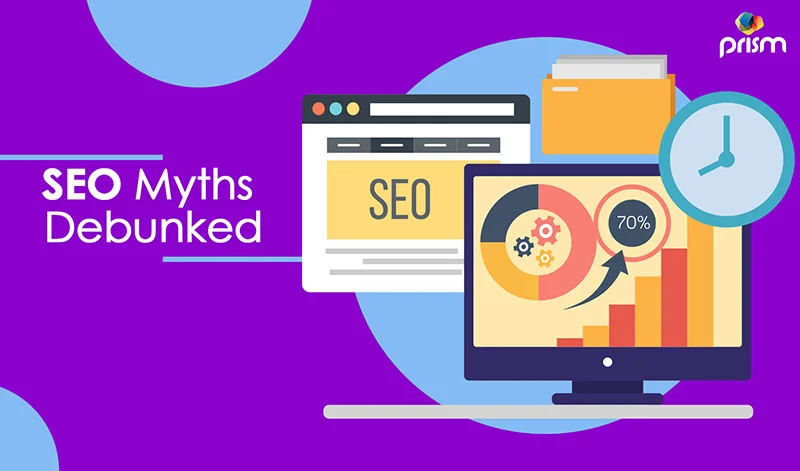

THE MOST COMMON SEO MYTHS

1. Google Penalizes Duplicate Content
Anyone who has been involved in SEO long enough knows there is a lot of confusion about whether duplicate content is still a penalty risk. The fact is that even Google knows it is not possible to eradicate duplicate content completely from the web.
Google wants to show the best possible results to you when you search for something. This usually means pulling up pages that offer great content and unique information rooted in facts, not fiction. If all of these sites were the same, it wouldn’t make sense to try to serve users with all the same information.
So, it can safely be said that if a website is not full of duplicate content and is not trying to manipulate search engines for rankings, it’s safe to have bits and pieces of duplicate content wherever necessary.
Moreover, there are ways to indicate which page you want search engines to rank such as canonical tags, sitemaps, etc.
2. Page with a Canonical URL is always the Preferred Version for Indexing
Putting a rel canonical tag on a page’s URL does not guarantee that that specific page will be indexed. It is just a signal that might or might not be accepted by Google.
We have seen that Google sometimes takes another page as the preferred page to be indexed and you can check it as well via Google Search Console. You can find it in the Index Coverage Report under the flag Submitted URL ‘not selected as canonical.’
If this happens, you should double-check if this is actually the page that you want to send people to. If it is then you should go back and check if the signal you sent to Google was actually leading to this preferred page.
3. Algorithm updates bring algorithmic penalties
Many experts still believe that Google updates such as Panda or Phantom resulted in penalties for a lot of websites. However, these are not penalties actually. The thing is, there is no such thing as an algorithmic penalty.
It is just that search engines change their requirements and the websites that fulfill those requirements to the fullest get a better ranking. There is actually no concept of ‘penalties.’ There is a small but significant difference between these two.
You might come across a lot of SEO myths and you might not be able to even understand which ones are facts and which ones are myths.
4. Google sandbox myth
Some people believe that Google suppresses newly built websites for some time and during that time the websites can’t rank organically. Different SEO professionals would propose varying opinions and you won’t know whom to believe.
Google’s response to this via a tweet is that there is no such thing as a sandbox, meaning the search engine doesn’t restrict the new sites from ranking.
5. PPC advertising helps organic ranking
Some SEO professionals believe that running paid advertising campaigns might also positively impact its organic rankings. It means that Google favors websites that run paid advertising campaigns. However, there is no direct correlation between the two.
Many SEO companies in Dubai and around the world suggest that If you run campaigns and continue to do SEO as well, there might be some benefits but saying that it increases organic ranking is actually false.
6. Domain age is a ranking factor
People believe that a domain’s age is a ranking factor. This impression stems from some old websites doing Good in terms of organic rankings. However, all that means that that specific website has had a lot of time to do things right and you can’t compare it with a six month old website.
It is understandable that an older website has had a lot of time gaining authoritative backlinks as well so we conclude that the domain age alone is not actually a ranking factor. Google’s John Mueller also refuted this idea saying, ‘Domain age helps nothing’.

7. Google Analytics data is used by Google’s algorithm
Some people believe that Google uses data taken from Google Analytics to rank websites organically. This makes them worried if their Google Analytics shows high bounce rates or low session duration and they keep thinking that their organic ranking might get affected.
However, it is just a myth and Google’s Gary Illyes debunked this myth saying, ‘We don’t use *anything* from Google Analytics in the algo’. This is enough proof that Google Analytics data has nothing to do with a website’s organic ranking.
8. The longer the content, the better
Some SEO experts believe and preach the notion that longer content ranks better. There are studies that say that the average word count of top-ranking pages is somewhere around 1400 to 1500. However, it is not a compulsion and it is definitely not a sure-shot way to rank your web pages.
Having said that, it is only logical that if you have enough valuable content that delivers actual value to the users, it would help rank the page and if the content doesn’t add value, it doesn’t matter if you keep writing paragraphs over paragraphs, it won’t get your page ranked.
So, aiming to have a specific number in terms of word count on a web page just to match that magical word count to rank is definitely not a smart way to go about the business.
9. SEO takes 3 months to work
Some people believe that SEO takes three months to work or show progress. Now it can be a good point to tell the clients or get out of a deadlock with your boss. However, there is no guarantee or time limit attached to SEO progress.
Once you start optimizing your pages, you might have to wait sometime for those changes to reflect. Moreover, it also depends on your niche. If you are in a low competition niche with not much content available, your pages might start ranking pretty quickly.
On the other hand, if you are in a competitive niche, you might find it hard to reach the first page even in six months. It has been seen that newer pages are not ranked easily in top SERPs so expecting results with respect time a specific timeframe is not the best way.
10. Bounce rate is a ranking factor
Many people believe that just because bounce rate is an indication of the people not staying on the website, it must be a ranking factor as it correlates with the quality of the website. However, this logic is a bit flawed because there can be a million reasons why a user bounces off the page.
It can be because the users just wanted to get a number and then right after bouncing back, the user called the company and converted. Now, this can’t be bad for a company but it is still a user bouncing for Google Analytics.
This is just one example of why bounce rate can’t be a ranking factor. As I mentioned earlier, a user can have a bad internet connection, etc. and consequently, the site couldn’t load and made them bounce off. Instances like this can cause a website’s bounce rate to go high.
It can also happen because of the website’s poor quality or poor content. No one can be sure and that is precisely why bounce rate cannot be used as a ranking factor.
This is it for today’s blog. I hope you liked reading it. Do share your thoughts and share if you’ve heard some other SEO myths. Most importantly, be sure to steer clear of these SEO myths and focus on concrete data.
If you are finding it hard to rank your website in search engines and your business is suffering because of that, contact Prism Digital, the SEO agency in Dubai. Our SEO experts will create and execute tailored SEO strategies that will help your website rank, and consequently reach your potential clients.

About The Author: Lovetto Nazareth
Lovetto Nazareth is a digital marketing consultant and agency owner of Prism Digital. He has been in the advertising and digital marketing business for the last 2 decades and has managed thousands of campaigns and generated millions of dollars of new leads. He is an avid adventure sports enthusiast and a singer-songwriter. Follow him on social media on @Lovetto Nazareth
Post Your Comment!
Recent Blogs
GEO, AEO, LLMO vs SEO: New Strategy or Just Old Wine in a New AI Bottle?
Orphan Pages in SEO: Hidden Technical Issues and How to Fix Them
The Dubai Edge: Cross-Channel Funnels Transforming the Game for Digital Success
Programmatic SEO: The Scalable Growth Engine Dubai's Top Agencies Use for Large Websites

Support
Phone: +971 55 850 0095
Email: sales@prism-me.com
Location: Prism Digital Marketing Management LLC Latifa Tower, Office No. 604 - West Wing World Trade Center 1, Sheikh Zayed Road Dubai, UAE
Subscribe
Join our newsletter to stay up to date on features and releases.
By subscribing you agree to our Privacy Policy and provide consent to receive updates from our company.
